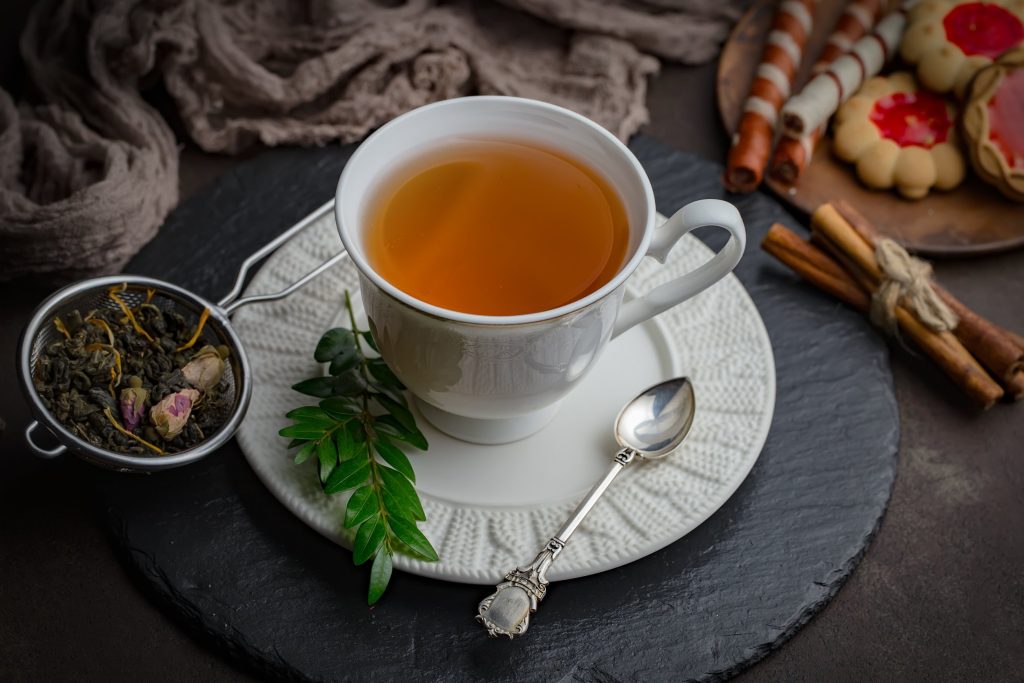Tea has been revered as a medicinal drink worldwide since time immemorial. Starting its journey from the East, it gradually won many hearts in the West as well. Tea owes its popularity to not only its exotic flavor but also its countless health benefits. Experts, scientists, and doctors have stated their opinion on the medicinal values of tea in any of its many forms. Countries like China and Japan have been using tea to treat ailments for centuries, and in recent years, Western countries have also adopted the same. There is no altercation when it comes to the fact that tea is beneficial for our health in many ways. In this article, we are going to discuss how tea impacts our health and why.

The benefit of having tea every day has a lot more to do than just make your mind alert for a good couple of hours. Drinking tea on a regular basis can help with cholesterol, and high blood pressure, improve heart health, and prevent cancer. However, tea’s benefits are not only confined to physical health but have also been proven impactful for mental health in many independent kinds of research.
What is Tea?
Tea is a light, aromatic beverage that is made by brewing the leaves of the Camellia sinensis plant. Mostly served hot, this flavourful infusion has immense popularity among people of all ages. It is the second most consumed beverage in the world, water being the first.
Types of Teas Explained!
There are mainly five types of teas- Black tea, Green Tea, White tea, Oolong Tea, and Pu-erh tea. However, all five teas come from the same Camellia sinensis plant. The classification of teas is principally based on how they are processed after being plucked. Here is a brief introduction of all the five teas and their health benefits:
Black Tea
Oxidation is a natural procedure that the tea leaves go through as they are exposed to air. This process is performed by the enzymes present in the tea leaves. The dark black color of the black tea is a result of the oxidation. Although all types of teas go through this oxidation process, black tea is distinct from them because of the higher degree of oxidation.
Black tea, besides being a rich source of antioxidants that neutralize the free radicals, also protects against lung damage owing to smoking nicotine, as per some studies.
Unlike the other variants of tea, black tea contains more caffeine. So, one must be aware of the intake.
Green Tea
Green tea is named after its appearance when brewed. It has a light green to pale yellow color, which makes it unique. The processing of green tea is slightly different from that of Black tea. Green tea leaves are put through a firing process where it is steamed or pan-fried to cease the oxidation process. Hence, the leaves don’t turn black and retain their natural color.
Green tea contains half as much caffeine as black tea, making it a healthier option for those who are into fitness. The lesser steeping time helps produce a lesser amount of caffeine.
Research [source] has found that green tea can potentially prevent lung, breast, liver, prostate, pancreatic, colorectal, and oesophageal cancer. According to a study in Japan, after an 11-year follow-up, it is shown that regular consumption of green tea declines the risk of mortality due to cardiovascular diseases. Green tea is remarkably high in flavonoid antioxidants called catechins, promoting heart health by reducing bad cholesterol. According to a recent study, consuming green tea three times a day prevents blood clotting and lowers the risk of heart attacks and stroke by 20 to 35 percent.
White Tea
Known for its delicate and mild flavor, white tea is the least processed tea among all the types of tea. It also goes through a minimal extent of oxidation. Being an unfermented variety of tea and because of going through the least amount of oxidation, the caffeine content of white tea is way lesser than the other variants. It is considered to be containing more potent anti-carcinogenic properties than the other teas.
Oolong Tea
Oolong is a traditional Chinese tea made from the leaves of the Camellia sinensis plant. Oolong tea is partially oxidized after being plucked and wilted in the sun.
When it comes to nutritional values, oolong tea contains a modest amount of calcium, magnesium, and other minerals and vitamins. A cup of oolong tea contains more caffeine than a cup of green tea. Due to increased production, oolong tea is gaining popularity among tea-lovers across the globe. What makes oolong different from green or black tea is the degree of fermentation and the presence of amino acids like L-theanine, which is responsible for the positive impact on relaxation and conscious mental activities.
According to research, theaflavins, thearubigins, and EGCG, the major antioxidants present in Oolong tea extract, are proven to have anti-cancer, anti-obesity, anti-diabetes, preventive of heart disease, hypertension, anti-allergic effect, and antiseptic effects.
A study in 2021 has shown that oolong tea wards off the symptoms of type 2 diabetes and helps keep blood sugar levels in check.
Pu-erh Tea
Native to the Yunnan Province in China, situated in the southwest of the country, Pu-erh tea is named after the city where it was born. Pu-erh is dark in color like that of the black tea, but it has a quite distinctive flavor because of the uncommon processing. This tea is made from the same Camellia sinensis plant. After being dried and rolled, it is put through a microbial fermentation process. The exclusivity lies in the post-fermentation procedure, which is the aging process. After fermentation, Pu-erh tea is kept to age for several years, giving it its unique dark color and distinguishingly rich, earthy flavor.
A study on animals observed a lower level of LDL cholesterol and less weight gain in the animal that was a part of the research.
Herbal Teas
Apart from the true teas, some beverages are not really ‘teas’ as they are not made from the Camellia sinensis plant but from some flowers, fruits, roots, or herbs.
Some examples of herbal teas would be chamomile tea made from the chamomile plant’s dried flower heads. Jasmine tea is an infusion of Camellia sinensis leaves and jasmine flowers. Rose tea comes from dried rose petals and buds. Hibiscus tea is made from the dried calyxes of the Hibiscus sabdariffa flowers; peppermint tea is made from brewing peppermint leaves in hot water. Rooibos is a herb native to Africa and is fermented to make it ready to be served as tea.
Different herbal teas have different health benefits, and they are primarily ingested to ease different health conditions, unlike the other true teas that are consumed for their distinct flavor.
For example, regular consumption of chamomile tea improves sleep and cures insomnia. It is great for liver and gut health, strengthens the immune system, alleviates stomachache, and reduces stress. Rose tea helps with muscle spasms and period cramps. Peppermint tea treats constipation and irritable bowel syndrome or IBS. Rooibos tea is purported to have anti-cancer properties. All these teas are also free from caffeine.
To Summarize

Although there is much more room for more well-run research or studies to pinpoint unerring facts about tea and its benefits, we can take the purported facts into account pro tem. To sum up, tea, irrespective of the type we consume, has the following health benefits, including the ones we have discussed before:
Boosts Metabolism: Tea, especially green tea, is known to have fat-reducing and metabolism-boosting properties.
Supports Mental Health: Tea reduces stress by inducing mental composure. Tea contains caffeine and a compound called I-theanine, which helps the mind focus and increase cognitive performance. I-theanine is responsible for relieving stress and signs of anxiety.
Improves Bone Health: A couple of European studies have shown that women who consumed tea had a higher bone density and lesser chance of osteoporosis than those who did not. It also prevents bone loss and hip breaks in postmenopausal women.
May Support Weight Loss: The amino acid in tea helps in burning fat content in your body. There may not be enough scientific research to prove the fact, but some studies have found that tea helps burn calories and accelerate weight loss. Also, tea curbs your sweet tooth preventing you from putting on more calories.
Good For The Brain: Consuming tea on a regular basis may protect the brain cells from developing serious diseases like dementia, Alzheimer’s, and some other neurodegenerative diseases. Research has confirmed that Alzheimer’s patients who consumed tea regularly had a greater cognitive score than those who did not.
It also improves memory cells by strengthening them and helping focus and attention.
No matter how many benefits tea has, one shouldn’t go overboard with the daily intake to avoid health hazards that could be caused by excessive intake of caffeine.









Let's discuss here - Share your thoughts and queries!